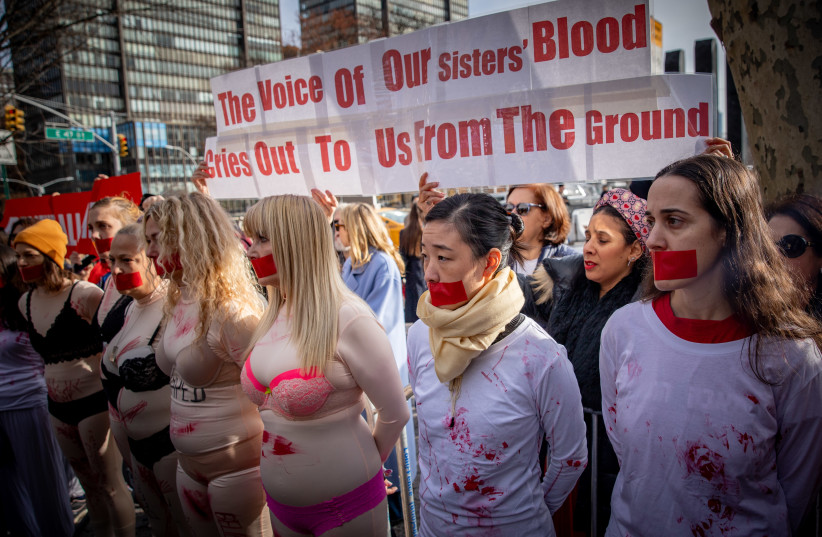The Association of Rape Crisis Centers in Israel released their official report on “Sexual Crimes in the October 7 War,” titled “Silent Cry,” and it was indeed aptly named.
The report details one of the most horrific attacks ever on a nation, and worse, it focused specifically on the violent and sadistic sexual torture and rape of Israelis.
It revealed that Hamas terrorists threatened victims and injured women with weapons while raping them violently, sometimes in gang rapes by multiple terrorists.
Partners, family, and friends were forced to watch to “increase the pain and humiliation for all present.”
Most of those victims were killed afterward, sometimes even during the act of rape. Others were found dead later, with their genitals mutilated beyond recognition or penetrated with weapons.

The report highlighted that many testimonies expressing the horrors witnessed or experienced cannot be publicized to protect the identities of those involved. Just imagine how many more there are that we don’t know about – how many hurt, traumatized women and men alike.
To say that reading the whole report made me sick to my stomach would be an understatement.
International feminists silent
Israeli women, namely those who identify, like myself, as feminists, have not taken lightly the fact that the international community to which we were once so dedicated has seemingly turned its back on us.
One of the foundational principles of modern-day feminism is to “believe the victim.” In essence, the argument goes that women and men are in a constant power imbalance – yes, even now – and therefore, women are constantly coming from a weaker position than men.
Then, when women, who are statistically far more likely to be sexually assaulted than men, come forward about being raped and such, they do so against far more force than if they were in an equal power dynamic with the men surrounding them. Women, as well, have a whole lot more to lose by coming forward.
At the heart of it, we must believe the victims because the torture they endured during the sexual assault is only one side of the coin; the other is the torture they endured by coming forward, being thrust into the spotlight and exposing themselves to hate and ridicule.
The women’s organizations and the human rights organizations that preach this, however, were nowhere to be seen when reports initially surfaced about the sexual violence carried out by Hamas terrorists on October 7.
We felt abandoned, all of us. We Israeli women stuck together, and when we saw our sisters being unimaginably abused, we felt their anguish because that is the shared pain of being a woman today. But our so-called sisters overseas did no such thing.
They watched the developments unfold. They saw the footage as it slowly came out; they saw the formal reports and testimonies as they spilled out of Israel onto the international stage, and still, they said nothing.
They saw the clips of women sobbing and of families being brutalized. They saw Naama Levy, the beautiful young woman who was dragged out of a Jeep, bloodstained between the legs, and yet they said not a word.
Some, like UN Women, eventually spoke up, calling for an end to all sexual violence. Others have yet to do so. Some members and representatives of such groups have outright denied the allegations of sexual abuse at the hands of Hamas altogether. In other words, they did exactly what they vowed not to do: they did not believe the victims.
This took me back, and I’m sure I’m not the only Israeli woman who felt this way, to several of the more severe cases of abuse of women in recent years in the country.
When a young British girl was allegedly gang-raped in Cyprus by a group of Israeli boys, the Israeli women’s organizations supported her. They went to the courthouse in Cyprus to express their backing, and she thanked them for it.
When a young Israeli girl was gang-raped in Eilat, Israel investigated the incident thoroughly, and now two of the most central orchestrators of that rape are going to jail for 14 and 22 years, respectively. We stood by her, and we held her attackers accountable.
In Washington, when the Women’s March took to the streets to express outrage at the treatment of women and the opposition to their bodily autonomy, we marched along with them.
But now, when Israeli women need that support back, they’re left for dead.
It is through this ordeal that I began to truly understand what Golda Meir meant when she said, “We have no place to go.” If any understanding has come to light as a result of the gender-based violence surrounding the October 7 massacre, it is this: the world, including fellow feminists, will never come to our defense, not regularly and certainly not in times of crisis when we need it most.
It’s good to know where we stand.
The writer is managing editor of The Jerusalem Post’s website, JPost.com.
